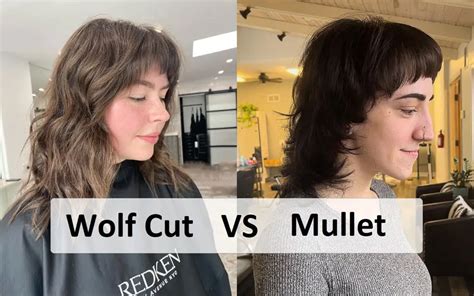What is a Wolf Cut?
A wolf cut is a hairstyle that combines elements of a mullet and a shag. It is characterized by short, choppy layers on top with longer, shaggy layers underneath. The wolf cut often has a “disconnected” look, with the top and bottom layers appearing to be separate hairstyles.

What is a Mullet?
A mullet is a hairstyle that is short on the top and sides, with longer hair in the back. The mullet was popularized in the 1980s, and it has since made a comeback in recent years. Mullets can be styled in a variety of ways, and they can be worn by both men and women.
Wolf Cut vs Mullet: Which Hairstyle is Right for You?
The wolf cut and the mullet are both edgy and stylish hairstyles. However, there are some key differences between the two styles.
- Wolf cuts are more versatile than mullets. Wolf cuts can be styled in a variety of ways, and they can be worn by both men and women. Mullets, on the other hand, are more traditionally associated with men.
- Wolf cuts are more low-maintenance than mullets. Wolf cuts do not require a lot of styling, and they can be air-dried. Mullets, on the other hand, require more styling to maintain their shape.
- Wolf cuts are more modern than mullets. Wolf cuts are a more recent hairstyle trend, and they are often seen as being more edgy and stylish than mullets.
Ultimately, the best hairstyle for you depends on your personal style and preferences. If you are looking for a versatile, low-maintenance, and modern hairstyle, a wolf cut may be the right choice for you. If you are looking for a more traditional hairstyle that is associated with men, a mullet may be the right choice for you.
The History of the Wolf Cut and the Mullet
The wolf cut is a relatively new hairstyle, but it is inspired by the shag hairstyles of the 1970s. The mullet, on the other hand, has been around for centuries. It is believed that the mullet originated in the 6th century BC, when it was worn by Scythian warriors. The mullet was also a popular hairstyle in the 1980s.
The Wolf Cut and the Mullet in Popular Culture
The wolf cut and the mullet have both been featured in popular culture. The wolf cut was worn by Miley Cyrus in 2020, and it has since been adopted by other celebrities such as Billie Eilish and Zendaya. The mullet was worn by David Bowie in the 1970s, and it has since been worn by other celebrities such as Billy Ray Cyrus and Brad Pitt.
How to Style a Wolf Cut or Mullet
The wolf cut and the mullet can be styled in a variety of ways. Here are a few tips for styling each hairstyle:
- Wolf cut: To style a wolf cut, start by applying a volumizing mousse to damp hair. Then, blow dry your hair using a round brush to create volume. Once your hair is dry, use a curling iron to create loose waves or curls. Finish by applying a light-hold hairspray to keep your style in place.
- Mullet: To style a mullet, start by applying a gel or pomade to damp hair. Then, comb your hair back and smooth it down. You can also use a blow dryer to create volume on the top of your head. Once your hair is dry, use a hairspray to keep your style in place.
Wolf Cut vs Mullet: The Pros and Cons
Here is a table summarizing the pros and cons of the wolf cut and the mullet:
| Hairstyle | Pros | Cons |
|---|---|---|
| Wolf cut | Versatile, low-maintenance, modern | Can be difficult to style, can look messy |
| Mullet | Traditional, associated with men, can be styled in a variety of ways | Requires more styling, can look dated |
Wolf Cut vs Mullet: Which Hairstyle is More Popular?
According to Google Trends, the wolf cut is more popular than the mullet. The wolf cut has been trending upwards since 2020, while the mullet has been trending downwards. This suggests that the wolf cut is the more popular hairstyle among consumers.
Wolf Cut vs Mullet: The Future of Hair
It is difficult to say what the future of hair holds. However, it is likely that both the wolf cut and the mullet will continue to be popular hairstyles. The wolf cut is a versatile and modern hairstyle that can be worn by both men and women. The mullet is a traditional hairstyle that is associated with men. Both hairstyles can be styled in a variety of ways, and they can be adapted to suit different tastes and preferences.
